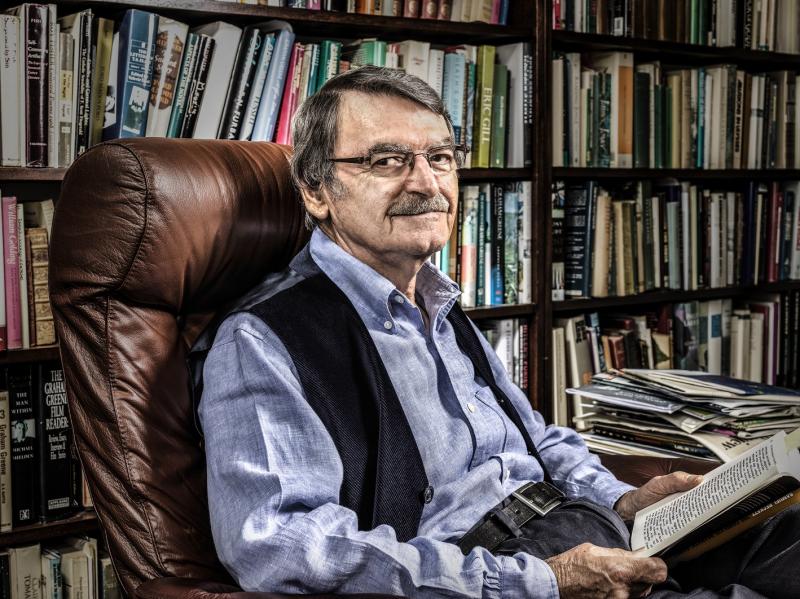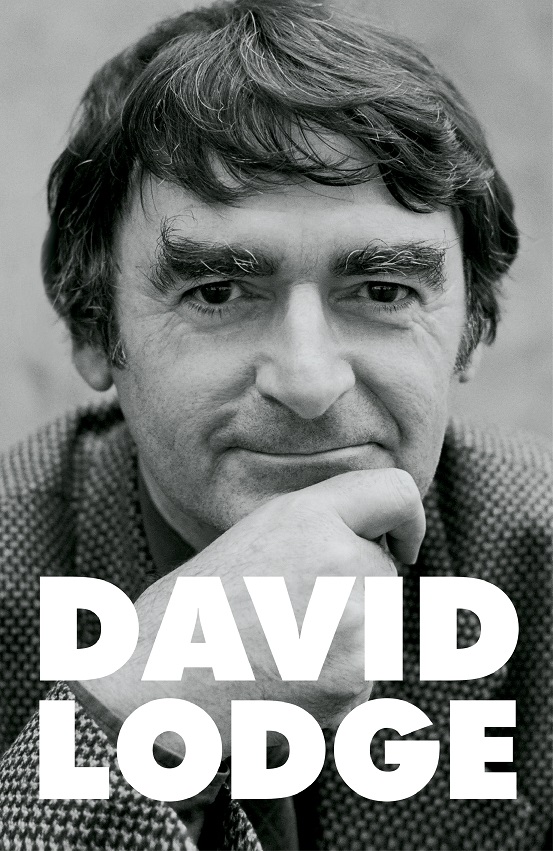David Lodge: Writer’s Luck - A Memoir 1976-1991 review - literary days, in detail | reviews, news & interviews
David Lodge: Writer’s Luck - A Memoir 1976-1991 review - literary days, in detail
David Lodge: Writer’s Luck - A Memoir 1976-1991 review - literary days, in detail
The prolific polymath's quotidian reflections on life and culture

Metaphor, metonymy, simile and synecdoche, anyone? FR Leavis, Roman Jakobson, Jacques Derrida, Frank Kermode? If any of this, and more, turns you on, this lengthy memoir will be irresistible.
It is the narrative of a somebody, but at times almost risibly reminiscent of George Pooter in The Diary of a Nobody. We are treated to a rundown of what furniture he bought, and from where, for his newly acquired pied-à-terre in Charing Cross, from a lacquered black ash table to tubular chrome chairs; every room of the house the family bought in Edgbaston, Birmingham is gone through, not to mention its alterations and renovations. It is a marmite memoir, an acquired taste which will have increasing value as a sociological description of a kind of polymathic life in the humanities that is now, with the internet, the demise of print, competitive media, and unremitting financial and political pressures on higher education, hardly possible. It is arguable that the scintillating careers, caressed in some respects by the media, of figures such as Lodge (or Melvyn Bragg, to take another instance) are just no longer viable for younger generations.
 Lodge has written a personal paean to a nearly bygone age. He was born (1935) in just the right time for the coming political culture which supported education through university, the NHS, and other aspects of the burgeoning welfare state. He came from a lower-middle-class family in south London, and his first memoir (from 2015) was called justly Quite a Good Time To Be Born and took the reader from 1935 to 1975.
Lodge has written a personal paean to a nearly bygone age. He was born (1935) in just the right time for the coming political culture which supported education through university, the NHS, and other aspects of the burgeoning welfare state. He came from a lower-middle-class family in south London, and his first memoir (from 2015) was called justly Quite a Good Time To Be Born and took the reader from 1935 to 1975.
For this second instalment, the phrase “writer’s luck” is heartfelt, for Lodge feels that his life has had more good luck – networks of colleagues and students, accidents and coincidences – than bad. The luck may have been the opportunities, but he had to have the wit and capability to capitalise on them. And he strongly feels that his own trajectory – from full-time academic and part-time writer, to early retirement from academe and making it very comfortably as a full-time writer – is no longer possible. Very few writers can now make a living exclusively from their craft, and he attributes the growing number of creative writing courses, rather ironically, to this changed economic climate: part-time teaching by established writers gives them an economic base.
The novels and other fictions are loosely based on his own experiences, including the great successes like Changing Places, where an American academic with the evocative name of Morris Zapp zooms to the fictional University of Rummidge somewhere in the Midlands (he worried that Birmingham colleagues might take offence) while a Brit, Philip Swallow, flies to California. Small World is an hilarious fictional account of academic conferences worldwide, the intricacies of human relationships on personal and professional levels. It has a subliminal framework, a subtle take on Arthurian legend, scholars seeking a kind of Holy Grail either in academic insight or personal relationships and ceaselessly travelling on such quests as though on semi-secret pilgrimages. The genesis of every novel is carefully, explicitly explained, deconstructed, as it were. One of the fascinations of the memoir is the variety of critical techniques that are shown: the explication is a kind of highfalutin’ Ladybird show-and-tell for grownups, ranging from the painfully obvious to the revelatory.
There is a touching theme throughout of his personal life beyond external achievement
Writer’s Luck details many of these international meetings as Lodge lived them – from seemingly endless British Council visits to other aspects of the wandering scholar, fellowships and visiting shifts of various durations as lecturer or professor. Not all is fun and games: there is one nightmare round-the-world trip here, some 15 flights in 23 days. Another real conference, but with farcical elements and absurdities, was that at the University of Strathclyde in Glasgow in the summer on 1986 on “The Linguistics of Writing” in which Lodge not only participated but also scripted for a Channel 4 documentary. You couldn’t make this one up, and he didn’t… These comings and goings are interspersed with marvellous set pieces: chairing the Booker Prize for example in 1989, when one of the judges, Maggie Gee, insisted on ideological correctness (the early term for political correctness), thereby dissing Martin Amis’s London Fields.
There is a touching theme throughout of his personal life beyond external achievement: his remarkably strong marriage to Mary, whom he met at University College London when both were undergraduates; Catholicism, a flickering candle but always there; their third child Christopher, with Down’s syndrome. As a whole, though, society does not figure much except in so far as Thatcher’s economic policies began what Lodge sees as an assault on universities, and his eventual disillusionment with continuing to teach at a time of changes that meant individual interaction with students became more and more difficult.
There are painfully detailed expositions of practically everybody he has ever encountered, especially those involved with his plays and television programmes, and moments when the reader is silently screaming to get out of the rehearsal rooms in which we are incarcerated with the author. Yet the very processes he details are also fascinating, described by a highly articulate and involved outsider as an intensely collaborative process, alien to the ways in which a critic or novelist writes. Love it or loathe it, this fleshed-out diary is curiously addictive.
- Writer’s Luck: A Memoir 1976-1991 by David Lodge (Harvill Secker, £25)
- Read more book reviews on theartsdesk
rating
Share this article
Add comment
The future of Arts Journalism
You can stop theartsdesk.com closing!
We urgently need financing to survive. Our fundraising drive has thus far raised £49,000 but we need to reach £100,000 or we will be forced to close. Please contribute here: https://gofund.me/c3f6033d
And if you can forward this information to anyone who might assist, we’d be grateful.

Subscribe to theartsdesk.com
Thank you for continuing to read our work on theartsdesk.com. For unlimited access to every article in its entirety, including our archive of more than 15,000 pieces, we're asking for £5 per month or £40 per year. We feel it's a very good deal, and hope you do too.
To take a subscription now simply click here.
And if you're looking for that extra gift for a friend or family member, why not treat them to a theartsdesk.com gift subscription?
more Books
 'We are bowled over!' Thank you for your messages of love and support
Much-appreciated words of commendation from readers and the cultural community
'We are bowled over!' Thank you for your messages of love and support
Much-appreciated words of commendation from readers and the cultural community
 Thomas Pynchon - Shadow Ticket review - pulp diction
Thomas Pynchon's latest (and possibly last) book is fun - for a while
Thomas Pynchon - Shadow Ticket review - pulp diction
Thomas Pynchon's latest (and possibly last) book is fun - for a while
 Justin Lewis: Into the Groove review - fun and fact-filled trip through Eighties pop
Month by month journey through a decade gives insights into ordinary people’s lives
Justin Lewis: Into the Groove review - fun and fact-filled trip through Eighties pop
Month by month journey through a decade gives insights into ordinary people’s lives
 Joanna Pocock: Greyhound review - on the road again
A writer retraces her steps to furrow a deeper path through modern America
Joanna Pocock: Greyhound review - on the road again
A writer retraces her steps to furrow a deeper path through modern America
 Mark Hussey: Mrs Dalloway - Biography of a Novel review - echoes across crises
On the centenary of the work's publication an insightful book shows its prescience
Mark Hussey: Mrs Dalloway - Biography of a Novel review - echoes across crises
On the centenary of the work's publication an insightful book shows its prescience
 Frances Wilson: Electric Spark - The Enigma of Muriel Spark review - the matter of fact
Frances Wilson employs her full artistic power to keep pace with Spark’s fantastic and fugitive life
Frances Wilson: Electric Spark - The Enigma of Muriel Spark review - the matter of fact
Frances Wilson employs her full artistic power to keep pace with Spark’s fantastic and fugitive life
 Elizabeth Alker: Everything We Do is Music review - Prokofiev goes pop
A compelling journey into a surprising musical kinship
Elizabeth Alker: Everything We Do is Music review - Prokofiev goes pop
A compelling journey into a surprising musical kinship
 Natalia Ginzburg: The City and the House review - a dying art
Dick Davis renders this analogue love-letter in polyphonic English
Natalia Ginzburg: The City and the House review - a dying art
Dick Davis renders this analogue love-letter in polyphonic English
 Tom Raworth: Cancer review - truthfulness
A 'lost' book reconfirms Raworth’s legacy as one of the great lyric poets
Tom Raworth: Cancer review - truthfulness
A 'lost' book reconfirms Raworth’s legacy as one of the great lyric poets
 Ian Leslie: John and Paul - A Love Story in Songs review - help!
Ian Leslie loses himself in amateur psychology, and fatally misreads The Beatles
Ian Leslie: John and Paul - A Love Story in Songs review - help!
Ian Leslie loses himself in amateur psychology, and fatally misreads The Beatles
 Samuel Arbesman: The Magic of Code review - the spark ages
A wide-eyed take on our digital world can’t quite dispel the dangers
Samuel Arbesman: The Magic of Code review - the spark ages
A wide-eyed take on our digital world can’t quite dispel the dangers
 Zsuzsanna Gahse: Mountainish review - seeking refuge
Notes on danger and dialogue in the shadow of the Swiss Alps
Zsuzsanna Gahse: Mountainish review - seeking refuge
Notes on danger and dialogue in the shadow of the Swiss Alps

Comments
This is a splendid review of
I've only just read this. I
I've only just read this. I can promise you, re the Booker judging in 1989 and at all times in my life, I have never insisted on 'ideological correctness'. I am, and have always been, a free speech advocate. London Fields is not Martin Amos's best book by a very long way - loo long and bearing many signs of the author's struggle to write it. What I did not like in 1989, and would not like today, was the unconscious assumption by some judges, but even more so, by the Press, that certain famous writers had a right to be on the shortlist. It's Groupthink. No-one is 'excluded' from a Booker shortlist: a few very good books win their way on to it, BY INDIVIDUL MERIT. Shortlisted authors included John Banville ( my personal favourite), Rose Tremain & Margaret Atwood, all on the best form of their lives. 'Excluded' authors ( to use your term) included the best book, in formal literary terms, and in courage, of Margaret Forster's career, Have the men had enough. I commend it to any readers of this comment. It's a far better book than London Fields.
Maggie Gee, Booker judge, 1989